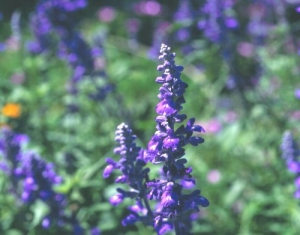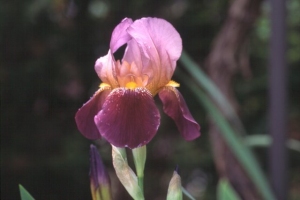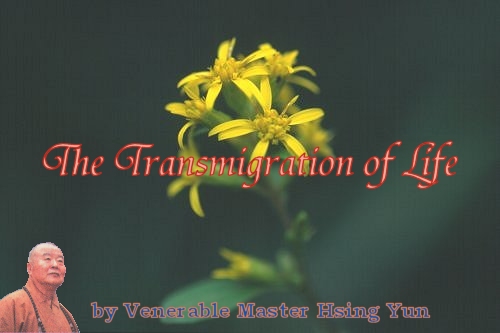|
Christianity teaches, "Believe in God and gain eternal life."
However, Buddhism believes that having faith in the Dharma does not
mean we are rid of the problem of living and dying. Rather, we should
see through them! Actually, living and dying are the most natural matters.
Even "The Buddha was born when the conditions were right and passed
away when the conditions were no longer there. He came and went solely
for sentient beings! "
Life and death follow each other like a shadow. Those who are born
will die and on dying will be born again. Living and dying have no end.
So where do we come from before birth and where do we go upon death?
Most people do not have a clear understanding of this question.
 According
to the Buddhist teaching of the Twelve Links of Dependent Origination,
sentient beings' beginningless ignorance, or avidya, and their committing
various actions, or samskara, result in consciousness, or vijnana. As
the alaya-vijnana develops a mother's womb and becomes a living being,
it is called name and form, or namarupa, the mental and physical components
of the living being. Within months, the physical body's six sense organs
of the eyes, ears, nose, tongue, body, and mind mature and are called
sadayatana. After the baby is born and comes into contact with the environment,
or sparsa, he/she has feelings, or vedana, and positive and negative
sensations which develop into likes and dislikes, or trsna. Further
grasping, or upadana, is developed for what is loved and enjoyed. Because
of the actions committed by the body, speech, and mind, the being, or
bhava, for the next existence is planted. Where there is birth, or jati,
there is inevitably old age and death, or jaramarana. Death is the beginning
of another lifespan. Therefore, Buddhism teaches that transmigration
of life and birth is without beginning or end. According
to the Buddhist teaching of the Twelve Links of Dependent Origination,
sentient beings' beginningless ignorance, or avidya, and their committing
various actions, or samskara, result in consciousness, or vijnana. As
the alaya-vijnana develops a mother's womb and becomes a living being,
it is called name and form, or namarupa, the mental and physical components
of the living being. Within months, the physical body's six sense organs
of the eyes, ears, nose, tongue, body, and mind mature and are called
sadayatana. After the baby is born and comes into contact with the environment,
or sparsa, he/she has feelings, or vedana, and positive and negative
sensations which develop into likes and dislikes, or trsna. Further
grasping, or upadana, is developed for what is loved and enjoyed. Because
of the actions committed by the body, speech, and mind, the being, or
bhava, for the next existence is planted. Where there is birth, or jati,
there is inevitably old age and death, or jaramarana. Death is the beginning
of another lifespan. Therefore, Buddhism teaches that transmigration
of life and birth is without beginning or end.
The cycle of birth and death is a natural law. Chan Master Chung Chien
said, "The existence and death of humans are like a drop of water.
In whatever state, it always goes back to water." Chan Master Dao
Kai right before he passed away said, "I am seventy-six-years old,
and my conditions in the world are fulfilled. I do not long for the
heavens while alive and have no fear of hell at death. I simply place
myself beyond the three, realms soaring freely with nothing to bind
me." In facing living and dying, Chan practitioners might conduct
their funeral prior to death, pass away while sitting or standing, or
go in the water singing all the way. Some might even dig their own graves
in the mountains and bury themselves. They were so carefree.
 The
life and death of sentient beings depend on their karma while the life
of the liberated saints and sages is fulfilled upon the strength of
their vows. It is not as extraordinary controlling living and dying.
What we really need is to transcend the life and death of our thoughts.
Chan Buddhism teaches, "By putting thoughts to death, our Dharma
body can live." Our thoughts rise and cease from moment to moment
as indicated in the Mahayana sutras, "The ceasing of the previous
thought is death and the arising of the next one is birth." In
reality, we face life and death every moment. The birth and death of
our thoughts are like a gushing torrent and only "non-thought"
can block 'the flow of life and death. If we are enlightened to the
truth of dependent origination and emptiness, then we can be like"
A wooden statue; viewing flowers and birds. It does not matter if thousands
of obstacles are all around." We can attain the existence where
life and death are one and neither exists. Therefore, the sutra also
teaches, "There is nowhere to go as the previous thought ceases
and the next thought arising has no place to come from." The
life and death of sentient beings depend on their karma while the life
of the liberated saints and sages is fulfilled upon the strength of
their vows. It is not as extraordinary controlling living and dying.
What we really need is to transcend the life and death of our thoughts.
Chan Buddhism teaches, "By putting thoughts to death, our Dharma
body can live." Our thoughts rise and cease from moment to moment
as indicated in the Mahayana sutras, "The ceasing of the previous
thought is death and the arising of the next one is birth." In
reality, we face life and death every moment. The birth and death of
our thoughts are like a gushing torrent and only "non-thought"
can block 'the flow of life and death. If we are enlightened to the
truth of dependent origination and emptiness, then we can be like"
A wooden statue; viewing flowers and birds. It does not matter if thousands
of obstacles are all around." We can attain the existence where
life and death are one and neither exists. Therefore, the sutra also
teaches, "There is nowhere to go as the previous thought ceases
and the next thought arising has no place to come from."
Life does not exist only at birth, and neither does it end on death.
We are like immigrants at death. We just move to another country. As
long as we have the resources for existence, merit, and Dharma wealth,
we need not fear about living in another land. Therefore, dying is nothing
to be feared. Where we go after death is much more important.
Chan Master Dao Yuan said, "If there is Buddha amidst living and
dying, then there will be no living and dying. If we understand living
and dying as the truth of nirvana, then we have no aversion to them
and even no desire for nirvana. We can naturally be liberated from life
and death." If we can clearly understand this truth and eradicate
our ignorance, our enlightenment will liberate us from the delusion
of life and death. Thus, we can settle ourselves beyond the fences of
living and dying and have no fear of death.
|


 According
to the Buddhist teaching of the Twelve Links of Dependent Origination,
sentient beings' beginningless ignorance, or avidya, and their committing
various actions, or samskara, result in consciousness, or vijnana. As
the alaya-vijnana develops a mother's womb and becomes a living being,
it is called name and form, or namarupa, the mental and physical components
of the living being. Within months, the physical body's six sense organs
of the eyes, ears, nose, tongue, body, and mind mature and are called
sadayatana. After the baby is born and comes into contact with the environment,
or sparsa, he/she has feelings, or vedana, and positive and negative
sensations which develop into likes and dislikes, or trsna. Further
grasping, or upadana, is developed for what is loved and enjoyed. Because
of the actions committed by the body, speech, and mind, the being, or
bhava, for the next existence is planted. Where there is birth, or jati,
there is inevitably old age and death, or jaramarana. Death is the beginning
of another lifespan. Therefore, Buddhism teaches that transmigration
of life and birth is without beginning or end.
According
to the Buddhist teaching of the Twelve Links of Dependent Origination,
sentient beings' beginningless ignorance, or avidya, and their committing
various actions, or samskara, result in consciousness, or vijnana. As
the alaya-vijnana develops a mother's womb and becomes a living being,
it is called name and form, or namarupa, the mental and physical components
of the living being. Within months, the physical body's six sense organs
of the eyes, ears, nose, tongue, body, and mind mature and are called
sadayatana. After the baby is born and comes into contact with the environment,
or sparsa, he/she has feelings, or vedana, and positive and negative
sensations which develop into likes and dislikes, or trsna. Further
grasping, or upadana, is developed for what is loved and enjoyed. Because
of the actions committed by the body, speech, and mind, the being, or
bhava, for the next existence is planted. Where there is birth, or jati,
there is inevitably old age and death, or jaramarana. Death is the beginning
of another lifespan. Therefore, Buddhism teaches that transmigration
of life and birth is without beginning or end. The
life and death of sentient beings depend on their karma while the life
of the liberated saints and sages is fulfilled upon the strength of
their vows. It is not as extraordinary controlling living and dying.
What we really need is to transcend the life and death of our thoughts.
Chan Buddhism teaches, "By putting thoughts to death, our Dharma
body can live." Our thoughts rise and cease from moment to moment
as indicated in the Mahayana sutras, "The ceasing of the previous
thought is death and the arising of the next one is birth." In
reality, we face life and death every moment. The birth and death of
our thoughts are like a gushing torrent and only "non-thought"
can block 'the flow of life and death. If we are enlightened to the
truth of dependent origination and emptiness, then we can be like"
A wooden statue; viewing flowers and birds. It does not matter if thousands
of obstacles are all around." We can attain the existence where
life and death are one and neither exists. Therefore, the sutra also
teaches, "There is nowhere to go as the previous thought ceases
and the next thought arising has no place to come from."
The
life and death of sentient beings depend on their karma while the life
of the liberated saints and sages is fulfilled upon the strength of
their vows. It is not as extraordinary controlling living and dying.
What we really need is to transcend the life and death of our thoughts.
Chan Buddhism teaches, "By putting thoughts to death, our Dharma
body can live." Our thoughts rise and cease from moment to moment
as indicated in the Mahayana sutras, "The ceasing of the previous
thought is death and the arising of the next one is birth." In
reality, we face life and death every moment. The birth and death of
our thoughts are like a gushing torrent and only "non-thought"
can block 'the flow of life and death. If we are enlightened to the
truth of dependent origination and emptiness, then we can be like"
A wooden statue; viewing flowers and birds. It does not matter if thousands
of obstacles are all around." We can attain the existence where
life and death are one and neither exists. Therefore, the sutra also
teaches, "There is nowhere to go as the previous thought ceases
and the next thought arising has no place to come from."